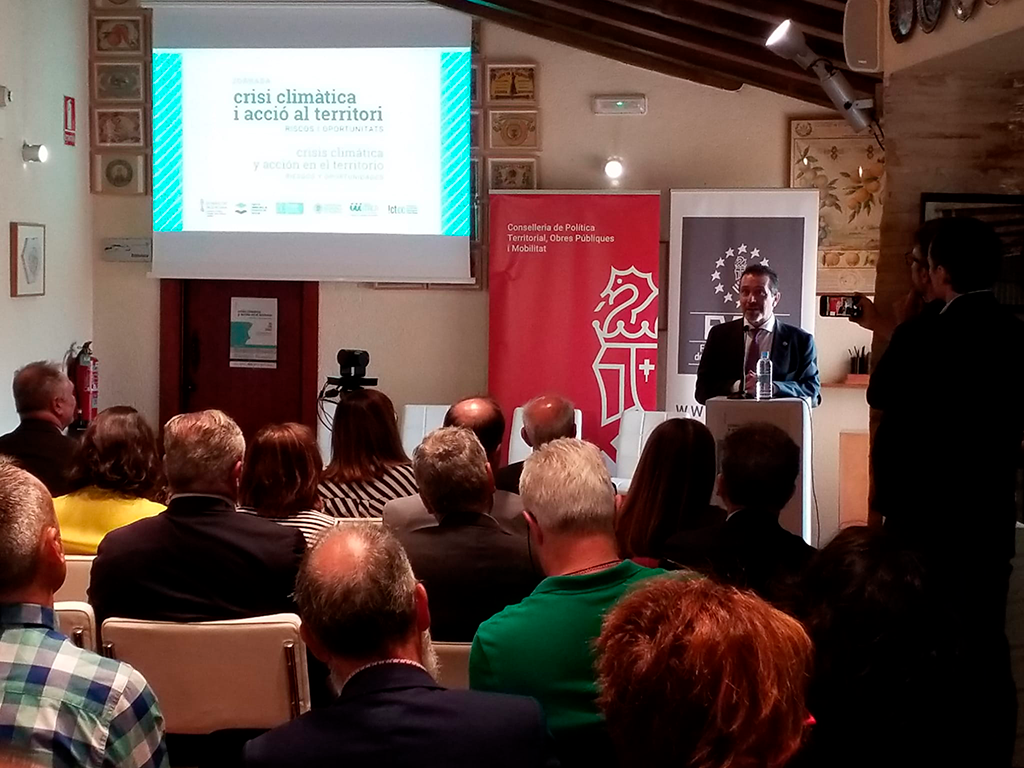
More than one million tonnes of carbon dioxide were emitted due to the forest fires that have severely affected the Valencia Region this summer. To put it in perspective, José Vicente Oliver, professor at the Universitat Politècnica de València (UPV), explains that «the amount exceeds, for example, the total emissions caused by private car traffic in the city of Valencia in a year, 670,000 tonnes of CO2, and is approximately equivalent to the total of annual car traffic in the three provincial capitals: Castellón, Valencia and Alicante».
Because of this situation, and to analyse the best possible way to deal with it, this week, the Agromuseu of the UPV hosted the conference «Climate crisis and action in the territory», organised by the Valencian Territorial Protection Agency of the Generalitat, the Valencian Federation of Municipalities and Provinces, and the ICT Research Group Against Climate Change of the ITACA Institute of the UPV.
In it, companies, political institutions and research experts in the field have discussed the factors and consequences of the current climate crisis and how to tackle it through cooperation.
The main cause is the abandonment of forest and agricultural management in inland villages.
«The debate focused on the fundamental underlying cause, which lies in the widespread neglect of forest and agricultural land management in our inland villages,» said Oliver, «accentuated by heat waves, droughts and dry storms.
For the UPV professor, «the climatic emergency and the accumulated fuel are the visible parts of the problem, but the root of the problem lies in a socio-economic deterioration hitherto unknown in the history of our territory. The 172 villages at risk of depopulation in the Comunitat have lost, in the last 20 years, more than 12,000 farms – practically all of them family-run – and 50,000 hectares of crops, which means reductions of 45% and 20%, respectively. Young farmers, foresters and livestock farmers are a rarity, and the few who want to work and stay in the sector find it very difficult».
The Emissions Observatory, key for local actors
During the conference, Javier Urchueguía, professor at the UPV, presented the Greenhouse Gas Emissions Observatory, an information and knowledge platform with scientific rigour created to help companies and town councils in the Region to face the challenge of decarbonisation, specifically in the framework of the challenges and opportunities that local actors face in the path to reducing emissions.
The mayors of the municipalities present very well received the initiative – Andilla, Enguera, Requena and Bejís, among others – who emphasised the value of the Valencian rural territory and its agroforestry wealth as levers for change.
European Green Pact, Recovery and Resilience Mechanisms and the Law on Climate Change in the Valencia region
In this regard, the participants in the conference highlighted the importance of the European Green Pact and the Recovery and Resilience Mechanisms – and all the associated regulations and aid funds – as well as the new Climate Change Law of the Valencian Community, as accurate guides towards an ecological transition that must be fair, both with the territory and with rural society.
Source: UPV’s Communication Area



